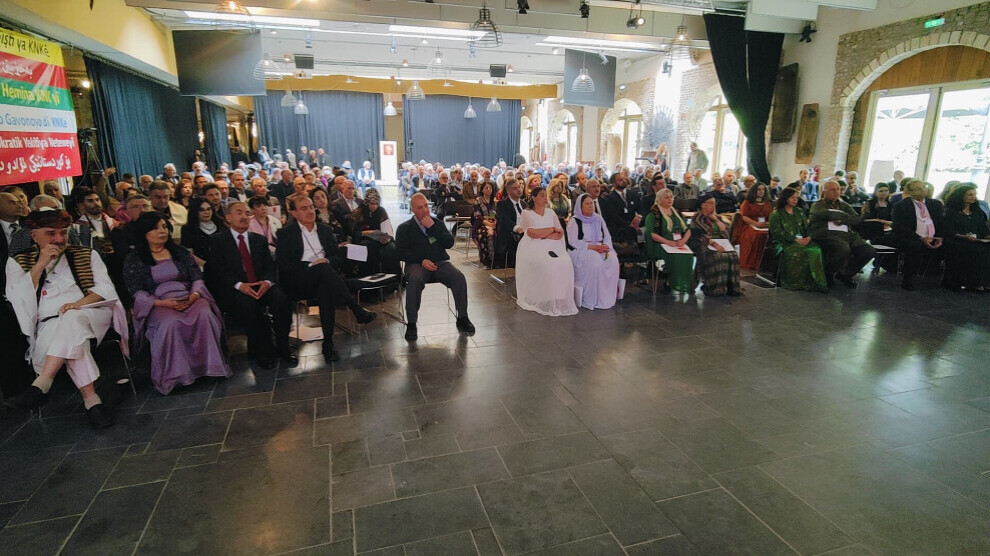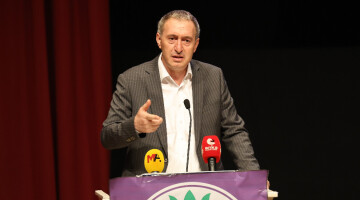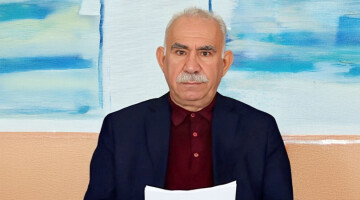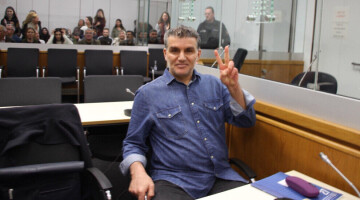The 23rd Ordinary General Congress of the Kurdistan National Congress (KNK) began in the Netherlands on Saturday. The two-day congress is attended by 300 delegates from the four parts of Kurdistan, as well as dozens of political parties, institutional representatives, intellectuals, artists, writers, and opinion leaders from the United States, Japan, Canada, Australia, and European countries.
Founded in 1999, the KNK has been working for national unity and cooperation among Kurds for 26 years. The 23rd Ordinary Congress aims to comprehensively address national issues, develop joint solutions, and make strategic decisions for the future. The Congress began with the national anthem ‘Ey Raqip’ and a moment of silence.
Then, KNK members Refik Gefür and Dilşah Osman gave the opening speeches. Refik Gefür commemorated Rıza Altun and Ali Haydar Kaytan, leading members of the PKK, and Heci Ehmedi, founding member of PJAK and member of KNK. Gefür said, "The work carried out by KNK for 26 years is very valuable. The new process initiated by the call of Kurdish People's Leader Abdullah Öcalan is crucial for the consolidation of the Kurdish people's gains and their unity. We expect the Kurdish people to embrace this process in every part of the Kurdish homeland. The KNK has contributed to national unity through the meetings it has held with Kurdish parties and forces over the past 26 years. The work carried out in Europe and around the world has played a vital role in protecting the gains achieved by the Kurdish people through the sacrifices of their martyrs."
Dilşah Osman pointed out that Kurdish institutions are working in the areas of women's youth organization, diplomacy, and politics, saying, "Today, we are going through a very sensitive process as a people, and it is very important to manage this process correctly. The Kurdish people must speak with one voice in all four parts. Diversity is natural, and parties and individuals may vary, but the Kurdistan cause and issue must take precedence over the interests of everyone and every party. At this moment, we are in a hopeful period in terms of unity. We must strengthen this further. If the same ideas emerge from a meeting held in any part of Kurdistan, this is the result of 26 years of KNK work."
KNK Co-Chairs Ahmet Karamus and Zeynep Murad then delivered speeches.
Zeynep Murad greeted the delegates and said: "The participation of representatives of all segments of the Kurdish people and different parties in the congress is very valuable. This diversity will strengthen the congress with suggestions and discussions. We have entered a new process. This process began on February 27 with Kurdish leader Abdullah Öcalan ‘Call for Peace and Democratic Society’. The Kurdish people must embrace this process because it is a very important new period. We must protect our gains in Bashur (Southern Kurdistan) and Rojava (Northern Syria). In the face of the change in the Middle East, the Kurdish people must also transform themselves and evaluate new opportunities. As the Kurdish people, we must be prepared for this new process. All parties and forces must unite. We must protect the rights of our people by acting together in the face of these innovations. Unity breeds unity; this process must be further strengthened."
Ahmet Karamus stated that a new conjuncture has emerged in all four parts of Kurdistan to protect the gains made, but that new risks also exist, and assessed the situation in the world, the Middle East, and Kurdistan in particular. Ahmet Karamus stated: "The wars and conflicts involving Russia, Ukraine, Israel, Hamas, and Iran are harbingers of new developments. Finally, the changes in Syria have set an unexpected process in motion. All of this demonstrates the complex dimensions of developments in the Middle East. These developments are forcing us into a new era. As the Kurdish people, we must also be prepared for this era. In our previous assessments, we had expectations and political interpretations regarding change on the 100th anniversary of the Treaty of Lausanne. Looking at today's developments, this change is not only possible but also on the agenda. However, this is a two-sided possibility; it could lead to positive renewal, but it could also have negative consequences.
The process initiated by Mr. Abdullah Öcalan's call is very important. The politics that will be built on this call is significant and forward-looking. This call addresses not only current issues but also the search for solutions for the future. In this sense, we view this call as historically significant. Let us embrace this call in all four parts and fulfill our duties. The aim of Mr. Öcalan's call is to find solutions to problems and unite our people around a common goal, taking into account the stage reached by the Kurdish Freedom Movement in all four parts. A new process has begun, especially for Bakur (Northern Kurdistan). Regardless of its name, this process marks the beginning of a new era. In this process, all parties and all regions will have a role and responsibility. If we fail to fulfill the requirements of this process, it will be a significant shortcoming.
Following Karamus' speech, the Congress elected its presiding committee. Rebwar Raşid, Midya Abda, Rojin Mukreyan, Şex Şemal, and Yakup Mirza were elected to the committee.
A documentary presentation on the history and objectives of the KNK was then shown.
The Congress continues with speeches by the participants.











